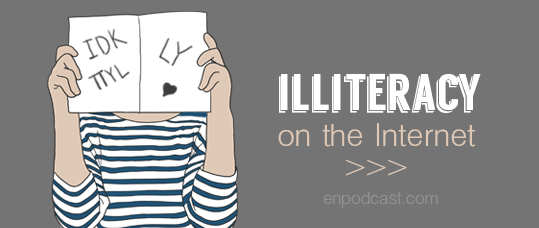Illiteracy on the Internet
About ten years ago nobody knew about such a supposedly useful thing as the Internet. In that time young people were still interested in spending long evenings with friends in the open air playing the guitar or some outdoor games. Then another kind of entertainment broke into their quiet and serene lives. It didn't require being in the street or somewhere else out of home. The Internet literally seized people's brains. Social networks were developing. It became easier to share the information. The youth was supposed to develop and learn as well. Instead they started to ignore more and more grammar and the policy of correspondence.
On the Internet we don't have to think about either orthography or punctuation. We still understand each other. But the habit of writing fast, just to hand the information, can cause irreversible consequences. It can lead to the appearance of the whole generation of people incapable of writing grammatically.
The level of literacy goes down appreciably only after few weeks of active use of social networks. You can notice it, catching yourself at making a couple of grammatical blunders. People's negligence in their own expressions may cause much more serious consequences.
Let's imagine that a professional journalist suddenly starts to write with mistakes. His reputation will fall without a doubt. The respect to him as a professional will fall as well.
Many employers look at the social network accounts of job candidates. And it is doubtful whether your inability to verbalize your own ideas on the Internet will help you to get a desired position.
The literacy among young people has come down indeed. There are two main explanation of this phenomenon. The first one is dislike for reading. We can't say that youth don't read at all. The curriculum obliges. Young people do everything to make their lives easier and to lessen the volume of work. The Internet helps with it.
Thus parents need to cultivate love for reading in children. In those families where parents read a lot, children will read as well. Kids need to be motivated. When a teenager comes to the library and asks for a book that he heard of and would like to read, we must give it to him immediately otherwise tomorrow he'll forget about it. Parents have to promote children's interest in reading.
The second reason, which hinders the development of literacy, is the love for shortenings. Typing SMS a teenager thinks only of how to put maximum information into minimum words. It goes without saying that the problem of communication in social networks is even worse. Moreover we can even observe that many children today have troubles writing and even holding a pen. It's much easier for them to type on the computer.
Some scientists distinguish three periods of human development: prewritten, written and – so far only as forecast – postwritten, when written language won't be needed at all. This gives you something to think about. Do we by any chance have one foot in this last period yet?
Vocabulary list:
supposedly
to break in
serene
to seize
policy
correspondence
orthography
punctuation
irreversible
consequence
incapable
appreciably
blunder
negligence
it's doubtful whether
to verbalize
to oblige
to lessen
to cultivate
to promote
to hinder
it goes without saying
habitual
without a moment's hesitation
to distinguish
to have one foot in (smth.)
















